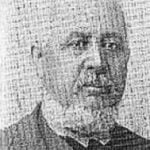
Henry Crittenden and Teena Crittenden his wife, John Ross Shoals, his son-in-law and Hattie C. Shoals, his wife, all of whom were buried in the Crittenden Burying Ground near the old Crittenden pioneer home east of Valliant, were four of the six original members of the Oak Hill Church in 1869.
During the last years of the slavery period, they lived in the neighborhood of Doaksville, and there enjoyed the occasional privilege of attending Sabbath afternoon meetings for the colored people, in the Choctaw Presbyterian Church. These meetings were at first conducted, by Rev. Cyrus Kingsbury and Mrs. Charles Stewart, wife of the storekeeper, and later by Parson Stewart. The instruction, given by the parson, consisted principally in reading selections from the Bible and shorter catechism. The rest of the time was spent in singing familiar hymns and giving testimonies. They became Presbyterians and formed a part of Parson Stewart’s first congregation at that place.
When they were accorded their freedom about the year 1865, they chose their permanent location in the Oak Hill neighborhood, about fifteen miles eastward. Parson Stewart followed them, and began to hold occasional services at the home of Henry Crittenden. He became the first elder of the Oak Hill Church, when it was organized in 1869, and during the remaining 25 years of his life rendered a zealous and faithful service.
Henry Crittenden enjoyed the reputation of being a “master mechanic.” During the slavery period, he was trained as a blacksmith, tinsmith and carpenter, and later acquired the art of repairing jewelry. Soon after he located on the Crittenden land, he built a shop. His intelligence and skill as a workman enabled him to attract customers from long distances. He was industrious and economical, and accumulated savings more rapidly than any of his neighbors.
He was a firm believer in the Bible and a regular attendant at Church. He encouraged the establishment of the Oak Hill Sunday school, of which J. Ross Shoals, his son-in-law in 1875, became the first teacher. He furnished most of the materials for the first frame school house in the Oak Hill district in 1878, and in 1887, when it was used in the erection of a larger building near the “Old Log House” and since known as Oak Hill Academy, he covered the deficit on the building estimated at $100.00.
He and Parson Stewart were the most influential of the Choctaw Freedmen, in securing the establishment of Oak Hill Academy, as a training school for teachers.
He manifested his joy, not only on the day of its lowly establishment by Miss Hartford in February 1886, but at every successive enlargement of its work, while he lived. He knew better, than many of his fellow Freedmen, the value of youthful training, and was enthusiastic in his zeal, to have every family far and near take advantage of its open door. An early teacher, who frequently heard him, writes: “He was a dear, good old man, a remarkable man in many ways. His ability to read was quite limited, but his voice was splendid for service in meetings.”
Teena Crittenden, his amiable wife, was as industrious and frugal in the home, as her husband, in the shop and on the farm. She was a devout Christian, one that loved the Bible and enjoyed the privilege of having a place at the meeting for prayer. She died at 67 in 1898, having outlived her husband four years.
John Ross Shoals, in addition to the Sabbath afternoon meetings at Doaksville, took some additional night work, that fitted him to become the first Sunday school teacher in the Oak Hill neighborhood in 1875, and an efficient elder in the Church. He died at 36 in 1885, leaving to Hattie, his wife, the responsibility of raising and educating a family of nine children.
Hattie Crittenden Shoals inherited the industrious and religious traits of her parents, in or near whose home she always lived. She surpassed many of her people, in the intelligent forethought she manifested in all her plans, and in the ability to exercise a correct judgment of men and conditions.
“I mean to have my children begin life, at a higher step than I did.” This was an ambition oft expressed in the presence of her children. She succeeded in giving all of them a good education, by sending them first to Oak Hill and then to other institutions, including Biddle university, Scotia Seminary, Tuskeegee and the Iowa State Agricultural college.
Henry Crittenden, 1830-1894.
Teena Crittenden 1831-1898.
John Ross Shoals 1849-1885.
Hattie Crittenden Shoals, 1850-1909.
